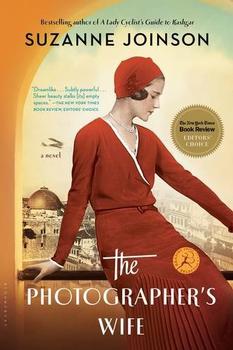Summary | Excerpt | Reading Guide | Reviews | Beyond the Book | Readalikes | Genres & Themes | Author Bio

'You,' he said. 'What is happening?'
'Devil if I know,' he said, shaking out his trousers, irritated, finally registering Prue, his eyes opening wide as if surprised to see an English child next to him even though she had been there the whole time.
A procession was coming into view. Prisoners, shackled at the ankles. Exhausted, dirty, stooped. Prue had never seen men like these. They were local, she guessed, villagers. No women. They were being herded along by a couple of the soldiers wearing the curious uniform made up of revolver belts of Wild West pattern and large-brimmed hats decorated with scarlet ribbons. The prisoners trudged slowly past the man on the ground, they were carrying something over their shoulders. Not a cross, surely? Not a pilgrimage, something else. The purser shoved his way through the aisle behind Prue now, a Turkish-looking official, letting out a whistle each time he moved.
' British gendarmerie,' the purser said, whistling and breathing near Prue. 'They've caught an outlawed criminal. They do this to show everyone what manner of men they are.' He wiped his hands on the red velvet waistcoat of his uniform as if to clean himself. 'But it is unnecessary. We already know what kind of men they are.'
The Englishman would surely speak to her now. He had looked at her. Now, I exist. But no. He closed his eyes, as if to shut out what was happening. A man on horseback emerged alongside the weary, walking prisoners, also wearing the odd, semi-official hat. The Englishman had opened his eyes and straightened his back and Prue saw that he was staring at this man on the horse.
The prisoners did not look up from the ground as they paraded past. They did not see the faces at the windows of the train, gawping and gaping. They were carrying a ladder, propped on the shoulders of four of the men, and strapped to the top of it was a body. She guessed it was dead, because she didn't think otherwise the arms and legs of a body would jangle at such an angle. She had never before seen a dead man. She wanted very much to photograph it.
When it had all passed, the Englishman took his belongings, including the birdcage, and moved to a different carriage without saying a word.
The driver waiting for her from the Hotel Fast was an ancient English serviceman called Gibbons, decked up with war decorations.
'Collecting one more,' he said, not offering to carry Prue's knapsack. Two minutes previously the platform at Jerusalem station had been a blur of suits and robes and sun helmets, the floor covered in packages and luggage largely made up of bundled sheets, but in an instant it had all vanished. Now the light was fading, Prue was hungry, regretting the whole film she had used on the Mamluk tower which was just that: a tower, surrounded by nothing. The driver gestured over Prue's shoulder. She turned. Here came the Englishman walking slowly towards them. She had been correct then. She knew it.
' Hello,' he said, as if he had not stood next to her at a window just half an hour ago. His travelling coat was very crinkled. 'I'm Flight Lieutenant William Harrington.'
' Yes. I guessed who you were on the train,' Prue said. Gibbons took his suitcase without saying anything and moved towards the dust-covered Crossley.
'I'm Prudence Ashton,' she said. 'You will be working for my father.' He did not reply and so she continued, ' Eleanora told me about you. You're the bird-catcher.'
The man – William Harrington – jolted at that, which was a satisfaction.
Sharing the back seat meant both of them having to cling to the handles inside the door to avoid being thrown into one another's laps as they bumped along the road.
Excerpted from The Photographer's Wife by Suzanne Joinson. Copyright © 2016 by Suzanne Joinson. Excerpted by permission of Bloomsbury USA. All rights reserved. No part of this excerpt may be reproduced or reprinted without permission in writing from the publisher.
Your guide toexceptional books
BookBrowse seeks out and recommends the best in contemporary fiction and nonfiction—books that not only engage and entertain but also deepen our understanding of ourselves and the world around us.